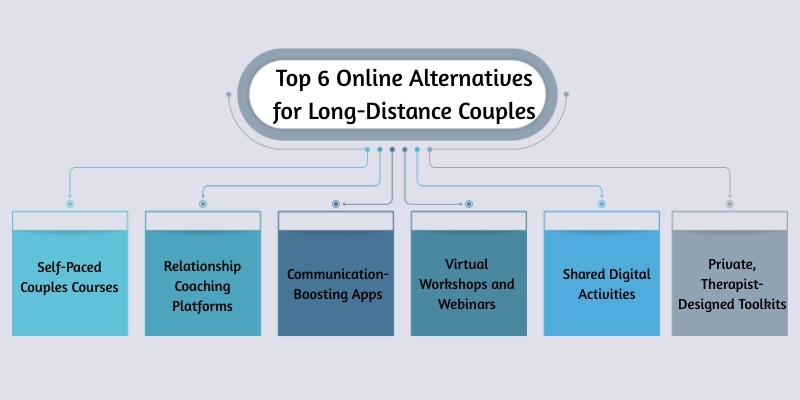Best Online Couples Therapy Alternatives for Long-Distance Relationships
|
Getting your Trinity Audio player ready...
|

Many couples today are seeking more effective ways to improve their relationships without relying solely on traditional therapy sessions.
That’s where online couples therapy alternatives come in!
These options provide partners with more flexibility, whether they’re managing busy schedules, working with tight budgets, or simply prefer tools that they can use at their own pace.
For long-distance couples, this is especially helpful; nearly 14 million people in the U.S. are currently in long-distance relationships, and many of them need creative ways to stay emotionally connected.
Alternatives can include workshops, guided courses, communication exercises, or coaching programs designed to strengthen trust and resolve conflicts.
These resources enable couples to practice skills at home, revisit lessons as needed, and even combine them with professional counseling when additional support is required.
Choosing the right approach depends on your unique situation, but the good news is that numerous accessible and effective options are available.
In this blog, we’ll explore practical alternatives to online couples therapy that can help you and your partner grow closer, build better communication, and create a healthier relationship together.
Why Long-Distance Relationships Need Extra Support
Being apart from your partner comes with challenges that couples who live together may not face every day.
Long-distance partners often struggle with miscommunication, trust concerns, and the emotional weight of feeling lonely.
Even small misunderstandings can feel bigger when there isn’t the comfort of a face-to-face connection.
That being said, thriving in a long-distance relationship is absolutely possible.
Couples who establish intentional habits, such as setting clear expectations, scheduling regular check-ins, and finding meaningful ways to connect, can maintain a strong bond despite the distance.
In fact, research indicates that 63% of individuals who have tried online therapy found it effective.
This means that tools like virtual counseling, structured communication programs, or guided relationship resources can make a real difference for couples who are physically apart.
With the right support, long-distance love doesn’t just survive – it can grow even stronger.
The Limits of Traditional Couples Therapy for Long-Distance Couples
While therapy can be a valuable tool, it isn’t always practical for couples who live miles apart.
Different time zones often make scheduling a session difficult, especially if both partners have demanding jobs or busy routines.
For some, the structure of traditional therapy can also feel too formal, making it harder to open up and have honest conversations.
Cost is another barrier; weekly sessions can quickly add financial stress on top of the expenses already tied to maintaining a long-distance relationship.
These hurdles leave many couples searching for long-distance relationship support that better fits their lifestyle.
The good news is that more flexible alternatives exist, offering the same level of guidance in a way that feels easier, more affordable, and more suited to the realities of long-distance love.
What to Look for in an Online Therapy Alternative
Not every couple finds traditional counseling the right fit, especially when distance, schedules, or costs make it hard to commit.
That’s why exploring online couples therapy alternatives can be so valuable. The key is to choose a resource that feels practical, engaging, and sustainable.
Good alternatives don’t just mimic therapy; they provide flexibility, hands-on tools, and real guidance that help partners grow stronger together.
Below are the key features to consider when selecting the right option for you.
- Accessibility across locations
- Flexibility for busy or mismatched schedules
- Interactive and practical tools
- Affordability without sacrificing quality
Let’s explore each of these factors in detail to understand how they affect the selection of the therapy alternatives.
Accessibility Across Locations
One of the biggest benefits of online programs is the ability to connect with others, regardless of your location.
A strong option should work from anywhere with an internet connection, allowing partners in different cities, states, or even countries to stay connected.
For example, a virtual couples course that can be accessed through laptops, tablets, or smartphones ensures you and your partner don’t miss out on valuable lessons, even if you’re traveling or on opposite schedules.
This accessibility is especially important for long-distance couples who may feel disconnected without consistent support.
Having resources available at any time also makes it easier to revisit lessons or exercises whenever challenges arise.
The best programs are user-friendly and device-friendly, providing a seamless experience across platforms – so, no matter where life takes you, your relationship tools are always within reach.
Flexibility for Busy or Mismatched Schedules
One of the main reasons couples hesitate to try traditional therapy is scheduling.
Coordinating sessions can be stressful, especially if you’re in different time zones or balancing demanding jobs. Online alternatives shine here by offering flexibility.
Look for programs that allow asynchronous participation, meaning you and your partner can complete lessons at different times but still share progress and reflections.
Self-paced learning takes the pressure off and allows you to move at your own speed. This way, no one feels rushed, and you can pause or revisit exercises as needed.
For example, many relationship coaching online platforms are designed with this flexibility in mind.
Partners can log in at their convenience, making it easier to maintain consistency without disrupting their daily lives. This flexibility makes it possible to build relationship skills even in the busiest seasons.
Interactive and Practical Tools
The most effective programs don’t stop at videos or reading materials; they encourage action.
Learning is most powerful when you can apply it in real-time, which is why interactive tools are essential.
Some online resources include guided communication prompts, structured check-in routines, or exercises designed to practice active listening.
Others offer worksheets, role-playing scenarios, and even digital conflict resolution tools that help couples map out disagreements in a healthier way.
Relationship experts also emphasize the use of technology to simulate an in-person connection.
Couples coach Dan Munro notes that “video calling is better than any other form of contact” because it allows eye contact, warning that “the lack of eye contact is even more damaging than the lack of touch in the long-distance relationship.”
He recommends positioning cameras so partners can truly look into each other’s eyes during calls (Marriage.com).
These tools transform abstract concepts into practical strategies that you can actually apply during challenging conversations.
For example, instead of simply reading about conflict management, you might complete an online activity that helps you and your partner identify triggers, explore alternative responses, and set goals for better communication.
These interactive features make learning more engaging and ensure the lessons stick.
Affordability Without Sacrificing Quality
Cost is one of the biggest barriers to traditional therapy. Weekly sessions can add up quickly, often reaching hundreds of dollars per month.
For many couples, especially those already managing the costs of long-distance travel, this simply isn’t realistic.
Fortunately, online therapy alternatives usually cost less while still delivering high-quality guidance.
Some options include subscription-based platforms that provide ongoing support for a fraction of the price of therapy.
Others offer one-time workshops or specialized virtual couples courses that focus on particular issues, such as rebuilding trust or improving communication.
The goal is to find a program that feels like an investment in your relationship rather than another financial burden.
Affordable doesn’t mean ineffective; as long as the program provides proven strategies, interactive tools, and professional insights, you can get excellent results without overspending.
With the right resources, couples can strengthen their bond, resolve conflicts more effectively, and build habits that last well beyond the screen.
Top 6 Online Alternatives for Long-Distance Couples

Not every couple has the time, budget, or comfort level to commit to traditional therapy.
Thankfully, there are many creative online alternatives designed to meet couples where they are.
These options are especially useful for long-distance relationships, where keeping emotional closeness can feel more challenging.
The right choice depends on your preferences; whether you want structured lessons, fun bonding activities, or simple tools to improve communication.
Below are six effective online alternatives that couples can explore to strengthen their relationship from anywhere.
- Self-Paced couples courses
- Relationship coaching platforms
- Communication-boosting apps
- Virtual workshops and webinars
- Shared digital activities
- Private, therapist-designed toolkits
Let’s discuss each of these alternatives individually to determine which one is best suited to your needs.
Self-Paced Couples Courses
For couples who prefer flexibility, self-paced courses are an excellent choice. These programs enable partners to acquire new skills at their own pace and revisit lessons as needed.
Many cover essential topics, such as conflict resolution, rebuilding trust, and enhancing intimacy.
The biggest advantage is control – you and your partner can decide when to engage with the material, whether that’s during a scheduled “date night” or individually when you have time.
With video lessons, worksheets, and interactive exercises, these courses provide structured guidance without the time pressure of live therapy.
Relationship Coaching Platforms
Some couples want a more personal touch but still need flexibility. That’s where relationship coaching platforms come in.
Unlike traditional therapy, coaching sessions are often more goal-focused and can be scheduled to fit into busy or mismatched routines.
Many platforms offer live video sessions with certified coaches who specialize in areas such as communication, intimacy, or conflict management.
The benefit is accountability – having a coach means you’re actively guided toward progress, but without the rigid structure of weekly therapy.
For long-distance couples, this creates a middle ground: professional guidance that adapts to your lifestyle.
Communication-Boosting Apps
When couples are apart, dedicated communication-boosting apps can help bridge the distance.
These tools use short daily prompts, check-ins, and shared activities to spark meaningful conversation beyond a quick “How was your day?”
As The Guardian notes, modern apps like Paired or Love Nudge offer “relationship maintenance for the time-poor, self-care curious” – essentially helping busy partners nurture their bond.
In practice, these apps enable couples to check in with each other regularly (often via brief daily questions), share updates on their mood or activities, and even coordinate plans across different time zones.
The result is a simple reminder to connect regularly, simulating the small moments of everyday life that build intimacy.
Expert coaches emphasize the same point: make connection a routine.
Life and relationship coach Kavita Patel stresses that long-distance couples need regular emotional intimacy.
As Patel notes, “emotional connection and support are so important in a long distance relationship,” and “keeping in touch and involving each other in daily feelings and situations is powerful to keep a feeling of intimacy flowing”.
In practice, the apps above help do exactly that – keeping partners in sync with reminders and prompts so that even when miles apart, the daily emotional connection stays alive.
Virtual Workshops and Webinars
Group learning can be surprisingly powerful for couples, especially when guided by a professional.
Virtual workshops and webinars provide couples with the opportunity to learn relationship strategies alongside others, eliminating the hassle of travel.
Topics may include building trust, handling conflict, or strengthening emotional intimacy.
These events often combine teaching with interactive Q&A sessions, allowing couples to learn from experts and also hear perspectives from other couples facing similar challenges.
It’s a supportive, community-style approach that many long-distance partners find motivating.
Shared Digital Activities
Sometimes, the best way to build a relationship is simply to have fun together.
Shared digital activities, such as online games, joint journaling apps, or collaborative creative projects, provide couples with an opportunity to bond without focusing solely on problems.
For example, partners might play an online trivia game, create a shared playlist, or build a digital vision board for their future together.
These activities add joy to the relationship, reminding couples that connection isn’t just about working through challenges – it’s also about creating positive memories, even from a distance.
Private, Therapist-Designed Toolkits
For couples who want a structured resource without the ongoing cost of therapy, private toolkits are an affordable and practical choice.
These kits typically include worksheets, communication cheat sheets, and step-by-step exercises, all designed by therapists to address common relationship struggles.
Take The F.I.G.H.T. Plan – Couples Conflict Toolkit, for example. At just $27, it offers couples ready-to-use scripts, worksheets, and strategies to help manage disagreements in healthier ways.
Positioned as a low-cost resource, it’s a great option for partners who want professional guidance packaged in an easy-to-follow format.
These toolkits are ideal for couples who prefer privacy and want tangible resources they can use repeatedly.
Creative Connection Rituals for Long-Distance Couples

When you’re miles apart, it’s not always the big gestures that matter most; it’s the consistent little things.
Long-distance couples often find that building intentional rituals helps bridge the emotional gap.
These habits don’t need to be complicated or time-consuming; they’re about showing up for each other in ways that feel reliable and heartfelt.
Creating small but meaningful patterns of connection can help reduce feelings of loneliness and strengthen love, even when you can’t share the same physical space.
Here are three simple but powerful rituals you can start right away.
Daily Micro-Connections
Every day check-ins go a long way in making your partner feel seen and valued. Short video clips, voice messages, or even a quick text can provide reassurance and warmth.
Unlike long phone calls, these micro-connections don’t require much planning, making them easy to fit into busy days.
For example, sending a “good morning” video message or a quick voice note before bed creates a rhythm that reminds your partner they’re always on your mind.
These little moments can carry more weight than you might expect, keeping emotional closeness alive despite the distance.
Weekly Virtual Dates
Just because you’re not in the same room doesn’t mean you can’t enjoy dates together.
Setting aside one night each week for a shared activity, such as watching a movie together, cooking the same meal, or playing an online game, helps maintain a sense of normalcy.
The important part isn’t what you do, but the fact that you’re carving out intentional time together.
A weekly date night gives you both something to look forward to, helps reduce monotony, and strengthens the idea that your relationship is a priority, even when life feels hectic.
Ongoing Shared Journals
A joint journal, whether through an app or something as simple as a shared Google Doc, can be a powerful way to stay connected.
Couples can use it to jot down daily gratitude lists, record meaningful memories, or share thoughts that may be hard to express in conversation.
Over time, this journal becomes a living record of your relationship; something you can both look back on when you need encouragement.
It also gives quieter partners a chance to express themselves in writing, deepening understanding and emotional intimacy.
Making Online Relationship Support Work for You
Finding the right resource for your relationship isn’t about picking the “perfect” option right away; it’s about being open to trying what feels right and adjusting as you go.
Every couple is different, and what works for one may not click for another.
That’s why it’s important to experiment with different types of online relationship support – whether it’s a self-paced course, a coaching platform, or fun digital activities – to see what truly strengthens your connection.
Before diving in, take time to set shared goals with your partner. Ask yourselves:
- What do we want to improve?
- Is it communication, trust, or simply spending more quality time together?
Having clear goals makes it easier to choose programs and measure progress as you go.
Finally, remember that consistency matters. Even the best tools won’t bring lasting change unless you practice regularly.
Whether it’s doing a weekly exercise, sticking to virtual date nights, or applying conflict-resolution skills in real time, the effort you put in each day builds long-term habits.
Over time, these small yet steady steps will create a stronger, healthier foundation for your relationship, regardless of the distance.
FAQs
Can long-distance couples do couples therapy online?
Yes, couples in different locations can attend therapy together online through secure, HIPAA-compliant platforms. Studies show about 63% of people find online therapy effective, making it a reliable option for long-distance partners.
Is online couples therapy as effective as in-person therapy?
Research shows that online and in-person therapy have similar outcomes, with many couples reporting equal progress. Online sessions also offer added benefits like flexibility, accessibility, and privacy.
What are some alternatives to therapy for long-distance couples?
Below are some effective alternatives to therapy for long-distance couples.
- Self-paced courses: Learn communication and conflict skills at your own pace.
- Relationship apps: Daily prompts and check-ins keep partners connected.
- Shared journaling: Use apps or docs to exchange gratitude and thoughts.
- Virtual Workshops: Learn skills alongside other couples without the need for travel.
- Digital activity guides: Fun games or projects to strengthen bonding.
How do time zones and scheduling affect online therapy for long-distance couples?
Different time zones make scheduling live sessions difficult. Asynchronous options, such as recorded lessons, flexible programs, or messaging-based counseling, help bridge the gap.
Conclusion
Being apart doesn’t have to weaken your bond; distance can actually inspire new ways to connect if you have the right tools.
Today, couples have access to a wide range of online therapy alternatives and self-guided options, making relationship support more flexible than ever.
From self-paced courses and communication apps to virtual workshops and therapist-designed toolkits, there are plenty of ways to stay emotionally close, no matter where you live.
The key is finding an approach that matches your lifestyle and practicing it consistently. Small habits, such as shared rituals and regular check-ins, can add up to significant changes over time.
Remember, love isn’t only about being in the same place; it’s about showing up for each other in meaningful ways.
Explore the flexible, private resources available online and discover how you and your partner can build a stronger, lasting connection despite the miles.
References
- CSP. (2020). Can you handle the distance? A look into social media and romantic long‑distance relationships. Retrieved from https://www.csp.edu/wp-content/uploads/2020/04/Can-you-handle-distance.pdf csp.edu
- The Inspirational Lifestyle. (n.d.). Mastering manipulation with Dan and Angie. Retrieved from https://theinspirationallifestyle.com/mastering-manipulation-with-dan-and-angie/
- Marriage.com. (n.d.). Marriage.com. Retrieved from http://marriage.com/
- The Guardian. (2022, April 8). Could a couples app revive your relationship? Retrieved from https://www.theguardian.com/lifeandstyle/2022/apr/08/could-a-couples-app-revive-your-relationship
- Brides. (n.d.). How to survive a long‑distance relationship. Retrieved from https://www.brides.com/how-to-survive-a-long-distance-relationship-5211093
- (2022). PMC: Long‑distance relationships and related study. Retrieved from https://pmc.ncbi.nlm.nih.gov/articles/PMC8956990/

